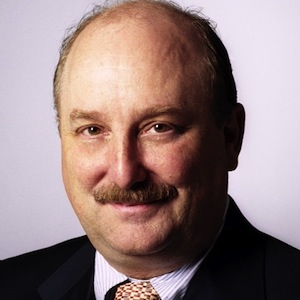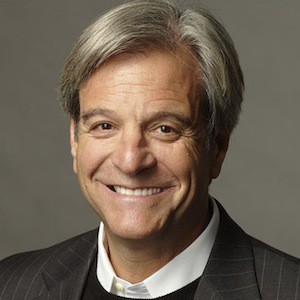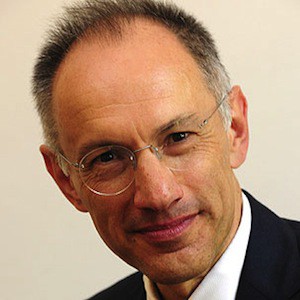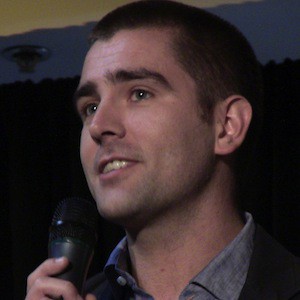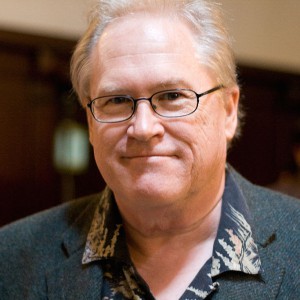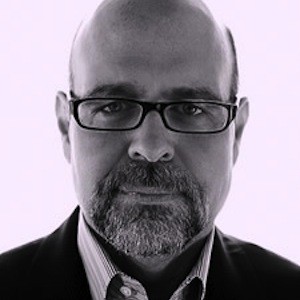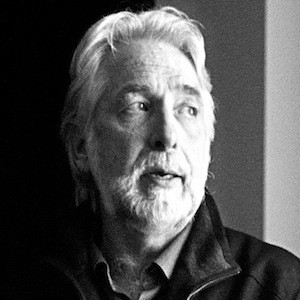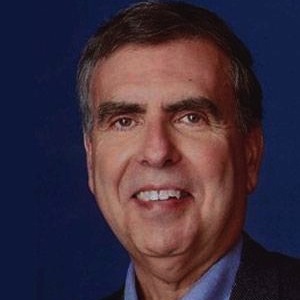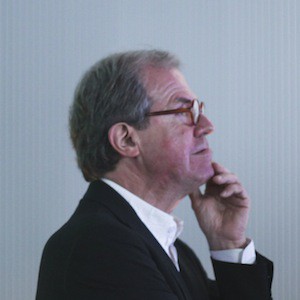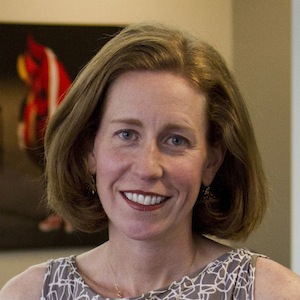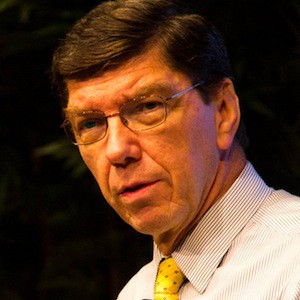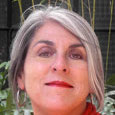John Huey: It is April 23rd at the Shorenstein Center at Harvard’s Kennedy School. I’m John Huey speaking with Will Hearst about his decades long experience in media, new media, old media. Will, we’ll get to all your qualifications in the course of the interview, but we usually start by asking people what was your first time? When did you realize that digital technology or technology was going to collide with news and change everything about the way…
Will Hearst: This is like a deposition.
John: Yes, exactly.
Will: Is your real name… [laughs]
John: When did you realize you had a challenge and an opportunity in front of you?
Will: That’s a good question. I came out of college in the early ’70s and went to work in San Francisco at the newspaper that my grandfather had first taken over when he came west. He had been born in the west and educated in the east. Then he was expelled, I think the term in that era was rusticated, from Harvard for pranks so he came back west. I believe his father said to him, “OK, it’s time to work, now.” He said, “Well, I have this idea. I’ve been studying Joseph Pulitzer and “The New York World,” and I have an idea how to run a newspaper.”
His father had won a newspaper in a poker game. In that era, if you wanted to become a U.S. Senator, you had to become elected by the state legislature. His father thought it would be useful to own a newspaper if you were going to run for the Senate. He had won his Senate seat so he had no further use for the newspaper.
His son said, “No, I think it’s an interesting business in its own right.” His father’s view was, “It’s not really a business, but if you want to horse around with it for a while, OK. Then you have to come to work.” Of course, my grandfather was able to make some traction with the newspaper.
I came to San Francisco, following in some of those footsteps, and went to work in the newsroom. I think I was one of the last people to come into a newsroom with linotype machines and casting type in metal. I remember being very impressed by people who would work out in the composing room.
In those days, because your story was submitted in paper and the person who edited it wrote on paper, it was approximate how big the hole was for your story. The legendary idea of writing the inverted pyramid, was you might be a little long or a little short.
Now, if you’re a little long, there’s a man in the composing room, and it typically was a man, who read upside down and backwards and see that you were long. He needed to be able to lift out one or two lines from the bottom of the chase to fit your story into the hole.
If it wasn’t exactly right, even then, or if it was a little short, then he had a table of shorts and he would drop one of those in. So newspapers, in that era, had shorts at the bottom of the column. That was the era in which I arrived in the newsroom.
John: So you started at ground zero?
Will: No, I started at the end of ground zero, at the last 30 seconds of ground zero. The publisher of the paper and the general manager had the idea then, that we could eliminate some jobs here. The notion was that we couldn’t go to an all electronic newsroom. What we might do is we might have people write their stories on a special Selectric Typewriter with a particular ball. Then it would be scanned.
John: Right, you had to mark the paper with…
Will: Right.
John: …blue pens and black pens.
Will: Exactly. The whole business notion was to eliminate some of the composing room people.
John: But they didn’t do anything in the front end? They didn’t touch the front end?
Will: No, very little in the front end. They weren’t entirely successful in eliminating the back end. Now, there were newspapers in Florida, small papers, not big papers. “The New York Times” abjured all this whole thing. Even “The Examiner,” in that era, was a labor saving experiment. You still had this vast armada of people with upside down and backwards reading skills and editing skills. You could see that there was a merger in the horizon of Internet…Well, it wasn’t called Internet, but computer technology and typesetting.
In the arc of this whole change, there were people who later came to see that the people in the composing room that ran those linotype machines, were not simple automatons setting type. That they had judgment as to where to break a line. They would throw a line away and set the line again.
It took a long time for us to realize there was a lot of human judgment and skill. It wasn’t until, maybe, 10 or 15 years later that the computer typesetting was good enough to substitute for a really good typesetter. Anyway, Larry Kramer, who is now the editor of “USA Today”…
John: We interviewed him extensively. [laughter]
In fact, it’s one of the best interviews we had.
Will: We were sent out, Larry and I, to go investigate this whole cold type phenomenon. I had been very lucky in high school to be involved with time sharing computers. It was obvious, even then, that you wouldn’t have to eliminate one or two. You could eliminate 10 or 12 steps, everything from stereotyping, engraving, typesetting and compositing except for the press itself. [crosstalk]
John: …just for context here, for people who don’t know it, you were a math major.
Will: I was a math major, right.
John: Harvard graduate, with computer experience. You weren’t just some cavalier. You were not Orson Welles. You were an educated man with some technological skills.
Will: [laughs] I did not see myself as a technologist or a professional mathematician. My family’s craft in business…My father’s view was, “What are you doing up there in college anyway? There’s a job here. We have something for you to do. How many more minutes do we need to wait until you go to work?” It was a backwards inference that these…
John: It turned out to be a good set of…Point of view now…
Will: It turned out to be a very good set of skills. It seemed to me very unthreatening to the craft of journalism that you could eliminate all of these intermediate craft skills and still practice journalism. The first wave of this revolution, that you are writing about and researching, was really about eliminating factory level skills, but with no change to journalism. The changes to journalism came in the second Internet revolution that took place in the ’95, ’96 time frame. I’m talking about the ’75 to ’85 time frame.
John: Just the computerization of the manufacturing process and nothing more?
Will: Exactly. Yes, it wasn’t perceived to make any change to journalism and news gathering. It was a change to the means of production. It was a Marxian change. With no change… [laughs]
John: It was a pretty bad system as I recall, too, for a while?
Will: I look back on it now a little bit differently. I realize, however inefficient it was, there were tremendous craft skills embedded in this thing. We did a project in the 1987 time frame. We went back and looked at the newspapers of the 1887 time frame. What I came to realize was that the more awkward and difficult the craft dimension, the greater the creativity. As you eliminated all of this inefficiency, you also eliminated an awful lot of skill, craft and judgment. Those old newspapers that did everything on hot metal with engraving, not even photography, had wonderful layouts, wonderful typography, wonderful illustrations. As you modernized everything, you squished out an awful lot of skills. One might argue that was a harbinger of what happened later.
John: It certainly happened in magazines, as well?
Will: Yes. The history of magazines is an interesting separate story with a bit of a time delay from newspapers. The magazine changes are still taking place. Whatever the revolution is, it’s still in progress in magazines.
John: Let’s get to that later. Because you are the chairman of the board of a company that publishes a lot of magazines…
Will: [laughs] Magazines, newspapers and broadcasting.
John: We can do it all. We’ve computerized the newsroom. Not the newsroom but the… [crosstalk]
Will: Right. The means of production, I think, was the first change.
John: At the same time, you’re in San Francisco which is not like being…You’re sort of at the white hot center of where a lot of this…
Will: It turned out to be the white hot center. Then the next major bell that rang was we had a strike at the newspaper in 1994 and ’95. Bill Joy from Sun Microsystems had come down to the newspaper. We were, like a lot of other people, in the middle of this, “We should do something electronically,” because it became apparent that the reporters were…
John: What year is this?
Will: 1994, ’95, I would say.
John: People were already online with AOL?
Will: Microsoft existed. Apple Corporation existed, but the Internet really didn’t exist.
John: AOL was up and running?
Will: AOL was just barely up and…I remember getting a call from Frank Caufield, who was the Kleiner Perkins partner who had invested in AOL, and said, “Could I talk to you about newspapers cooperating with AOL?” My reaction was, “Well, Frank, we’ve got teletext. We’ve got PLP. We’ve got the Source. We got CompuServe. We’ve got all these people wanting to find some way to take the newspaper content and put it online. What’s special about AOL? Other than the fact that you and I are friends, what is special?”
John: Now, was Hearst, were you doing any business with those?
Will: No.
John: You were just publishing a newspaper?
Will: We had a few little groups of people studying what was called electronic publishing which is a little bit like [laughs] …I have the picture in my mind of the first people in aviation talking to the railroad czars and saying, “We have this notion that you could fly…
John: Flying trains?
Will: Yes, and their reaction was, “A flying locomotive? I don’t get it.”
John: [laughs]
Will: We were in the era of electronic publishing, which was…
John: “The San Jose Mercury News,” down the road from you, was involved in all… [crosstalk]
Will: They had their own policies. There were a number of different newspaper companies that had different approaches. The thing that I remember that was kind of a shift was when Bill Joy and a few people came down to “The Examiner” and said, “You know, all of these systems require that you mold your content into their system. For AOL, you have this system. For the Source, CompuServe, you have this system. For PLP, AT&T, had a big project to do electronic publishing. You have all these other systems, but there’s sort of HTML thing where you just have one system. If you do that, then you’re automatically compliant with all these others.”
We thought that was interesting. I think the strike, like a crisis of any kind, forced us to walk across this chasm before we were ready to make a decision about which of the different systems was the right thing to do. We saw that if we put our content in this other format, then we could rapidly disseminate it.
That was when we realized, wow, you really could eliminate all of the production steps, including the paper and the printing.
We did a study, and I was talking about this earlier today, where a bunch of newspapers anonymously contributed their P&L structure to a newspaper industry, I think it was the Midland Newspaper Study. I may have the name wrong.
The point was, you went in there. You couldn’t see it was “The Examiner” or “The Bakersfield Californian,” which paper it was. All the newspapers went in there and you could get an x ray, a CAT scan, of the structure, the economic, the business structure of newspapers.
What I remembered learning was, “Wow, the newspapers that have the most expensive newsrooms spend about 12 percent of the total revenue of the business on the newsroom. And the most economical, stingy newspapers spend about 8 percent.” Between 8 and 12, and largely clustered around 10, was the percentage of revenue that went to the newsroom.
We thought to ourselves, “Wow, if you could get rid of that 90 percent, that other 85 to 90 percent of cost structure, you could preserve the newsroom pretty much as is.”
This could not be a threat. This could be a wonderful opportunity.
John: You saw it, immediately, as an opportunity for eliminating distribution, manufacturing, postage?
Will: I did. Right. I realized that the Examiner, in that era, spent and inordinate amount of money on gasoline. Between the trucks, the teamsters, the repair of the trucks and the gasoline, we were spending a ton of money. Not a lot of it was going to the columnists, [laughs] the reporters and the travel budget of the newsroom. A lot of it was going to these structural costs. Even as late as that time period, I thought, “Well, this could be a very good thing. We could get rid of a lot of structure and cost that doesn’t relate to the thing that we most care about doing. So what if we don’t do that anymore? Maybe we should get rid of the paper altogether.”
Several things intervened. One was the overall revenue of the newspaper industry collapsed so 10 percent of a big number is still larger than 10 percent of a small number. When the revenue itself collapsed, the newsroom also had to adjust, even in this ideal 10 percent model.
I think more recently, I’ve been thinking about other issues that have to do with where do people really spend their time? The younger generation of my children don’t spend time with print and news the way my generation did. Therefore, the intermediation of Google, Apple and others has really disrupted the whole business model in ways that did not seem necessary to me in this simple 10 percent analysis that I’m talking about. That’s still going on today.
John: When do you first realize, like many people in the industry saw, this as a great opportunity for eliminating a lot of PP and D…
Will: Yes, all the stuff we didn’t want to do.
John: It wasn’t particularly glamorous or useful. When did you first, when did the light bulb go off and where you went, “Oh, this isn’t just an opportunity, this is a threat to the whole medium?”
Will: You know, this part of the story is hard to unscramble the egg because I don’t know the magazine industry quite as well. In the newspaper industry, one of the initial reactions was, “Oh, well, this is all about audience. We should not charge for anything that we do. We should give away what we do for free. We’re in competition with Google, and whoever gets the most audience wins.” And so we went into this in a very naive…
John: Before Google, even, you were in competition with Yahoo and AOL.
Will: Yahoo was first.
John: Everyone was chasing traffic…
Will: Right. I’m trying to think. There was a company that we…Oh, gosh. Jim Bellows went to work for the company that folded. It was one of Yahoo’s early competitors. I can’t think of their name, but if you… This is how quickly life changes.
John: I’m sure they come up numerous times, and there were all these search engines. There was Lycos and…
Will: Yes.
John: …there was Yahoo. There was AOL. There was Prodigy, CompuServe.
Will: There’s one I’m trying to think of, but it’s not coming to mind. But anyway, they ended up merging into the @Home combine of companies.
John: Excite?
Will: Yes, Excite. Jim Bellows went to work for Excite. He showed them, “Look. It’s not enough just to have all this information. You also could have headlines. You also could have writing. You could also have some content. So in that pre Google era, Excite and Yahoo were the big ticket items.
John: Were you investing in that? When did you first…
Will: Well, Kleiner Perkins invested in Excite.
John: When you were there?
Will: Yes.
John: And you joined Kleiner Perkins around ’95?
Will: ’95.
John: So tell us a little bit about that. You’re a newspaper editor… [crosstalk]
Will: I had known Steve Jobs and Bill Gates. I had been very interested in their success and a big believer in the power of computer technology. I wasn’t thinking of computers so much as an information technology, but just as a cool technology.
John: So this was an unrelated…This was a…
Will: I knew them. I had covered them. I had interviewed them. I had done their thing that Walter has done more recently. I had profiled them and written about them as a new phenomenon in the business world. I hadn’t seen it as directly related to what I was doing. The personal computer, I think the Apple II was ’84, ’85.
John: The Mac came out…
Will: The Mac came out later, ’87, ’86, that time frame.
John: Well, anyway, the PC was ’81.
Will: Yes.
John: The Mac was ’83 or 4 I think… [crosstalk]
Will: OK. All right. ’84 sounds about right.
John: Yes, about ’84 and that was the beginning of self publishing.
Will: Desktop publishing.
John: No one saw that at the time, but that’s what…
Will: Well, desktop publishing’s first appearance was a great labor saving and cost saving opportunity for newspapers who were real publishers so…
John: Now you come in and put the front end into it…
Will: Right, exactly.
John: …which does make a lot more sense than that scanning. [laughter]
Will: Yes. It was an intermediate step, scanning. It wasn’t until later that it became apparent that these were real…There were a lot of people doing customized news services. Somebody’s going to write an anthropology of this whole thing because there were a lot of false starts.
John: Yeah. We have a lot of that in…
Will: Yeah, I’m sure you probably do.
John: We’ve gone back to a lot of people in these digilabs. There’s a guy…
Will: Negroponte, Lycos, all these guys.
John: There’s a guy, who in 1995 for Knight Ridder, made a video of himself holding up something explaining how it’s going to work. It is the, by God, iPad. I mean he’s [laughs] got it there, and it actually exists but…
Will: This is one of the things that happens in technology, is that people come up with pretty good early airplanes that don’t quite fly as well as the Wright brothers. John Sculley had a kind of…
John: Oh, the Newton?
Will: …Newton device that was a pre Blackberry. John Doerr, my partner at Kleiner Perkins, was interviewed for the better part of a decade. The negative question was, “Well, what about Dynabook?” That didn’t work. That was kind of [laughs] a laptop computer because he had invested in Compaq which was this suitcase computer. Then he had the idea for this black and white thing that was even flatter, smaller and Alan Kay inspired. It had flopped so there was a lot of probing questions like, “Well, that was kind of a disaster.” Many of these things came out early and didn’t work.
John: You saw a lot of them, and you were interested in computers?
Will: We all saw a lot of them. We all saw a lot of them.
John: But your move to Kleiner Perkins didn’t have much to do with your hat as a media executive. It was more your interest in technology?
Will: Well, I came to the conclusion in the ’95 time frame, maybe, in retrospect it’s more clear, that I had missed the first generation of the computer revolution, the personal computer. I remember interviewing for a story in “The Examiner” the computer club of Palo Alto. At that time computers had switches and lights on the front. The guy was telling me, “Well, there are these two guys, Jobs and Wozniak, that have a computer that doesn’t have any lights and switches on the front. In fact, it goes directly to a monitor. I remember asking as my interview question, “Well, that’s not going to work because no one’s going to know what the computer’s doing if you can’t see the lights and the switches on front.”
[laughter]
Will: I was like, “No one’s going to get that to work.” The guy said, “Well, they don’t think that you need to see that.”
John: [laughs]
Will: I took the story back to the news room, and the editor told me. I said, “This is a phenomenon. I’m not saying it’s good. I’m not saying it’s bad. I’m just saying it’s happening.” He said, “Well, a phenomenon. I don’t know. I mean ham radio’s a phenomenon. Go back and fill…What do people want to do with computers? I can’t run the story as a technology story. Go back. What are the applications?” I went back to Albrecht to the People’s Computer Club in Palo Alto. I said, “My editor wants to know what are people going to do?” He said, “Well, it’s unclear, but there’s two things that I think are emerging as uses of the computer. One is filing recipes and the other is writing your own Fortran programs.” So I put [laughs] in the story, filing [laughs] recipes. There was no word processing, no Internet, no teletyping, no communications, no graphics. [laughs]
John: Well, just as a historical…
Will: I was able to get the story to print [laughs] on filing recipes and writing your own Fortran programs.
John: Well, just as a historical note, you now own the largest online [laughs] trove of recipes in the world. [laughter]
John: So don’t laugh.
Will: So don’t laugh.
John: I think you paid a lot of money for it?
Will: Hey, you know? It’s better to be lucky than smart.
John: Those are expensive recipes, and you own them all.
Will: That was the level of sophistication, the level of analysis. I mean, the idea of communications…I remember a guy who had been my college roommate, here at school, saying the computer was going to be a communications device. I thought that was like a…
John: Now who was that?
Will: A fellow named John Moussouris, who was my college roommate.
John: He saw that in college?
Will: No, he saw that fairly early. He founded MicroUnity and MIPS so what time frame would that be? That would be pretty much the ’95, ’96 time frame. It had become apparent that the computer was more than a computing device, but it was still very nascent that there was a communications future or a media future in computers. Remember Telex?
John: Oh, yes.
Will: I got into a lot of trouble at “The Los Angeles Herald Examiner” for sending a telex to India because I realized it was a lot like typing. [laughs] I remember the editor saying, “Some idiot has sent $180 of communications to India. Who the hell is that?” I was going, “Oh, Shit. That might be me.”
John: [laughs] Oh, that’s right. I forgot. Bellows worked for the “Herald Examiner”…
Will: Yes, he did.
John: …which was a Hearst paper and…
Will: Yes, it was.
John: …then he was at Excite.
Will: Yes, he was. Right.
John: That had something to do with how you got to Excite?
Will: In fact, we had already invested in Excite. We missed the…
John: “We” meaning…
Will: We, Kleiner Perkins. We had missed the opportunity to invest in Yahoo. Vinod had asked me to call Jerry Yang and say, “We’re interested. We’d like to invest.” His view was, “We’ve already got our deal. It’s too late.” We invested…
John: Mike Moritz, who we interviewed, was one of the first in their…
Will: Sequoia, I guess, was in there. Then we did Excite. Then when Excite got started, one of the first things Vinod asked me to do was…
John: Tell me why the idea of Excite was in your mind?
Will: It was a search engine. In the beginning Yahoo was considered to be a Dewey Decimal catalog…
John: It was a list.
Will: …of the Internet.
John: Giant list.
Will: Excite was more of an algorithmically driven site. Now…
John: Excite was just Google that didn’t quite get there?
Will: Well, one of the mistakes that I think we made at Excite, and the people that were there might take great exception to this theory…This is my story, my interview. I think one of the things that we thought of was that Yahoo was an intermediate editor. A curatorial layer that would parse the Internet into a gigantic Dewey Decimal course catalog. Excite was much more algorithmic. Then some of us had the idea of, “Well, we could make money if we charge people to be listed higher in Excite.” I remember thinking, “Wow, this could be the equivalent of “The New York Times” saying you can get a better review for your movie if you’re an advertiser than if you’re not.” That would then not be a movie review. It would be a paid listing.
This did help catapult Excite to catch up with Yahoo from a business proposition, but it polluted it. I remember first meeting Larry and Sergey. They had a violent opposition to this idea, that the algorithm ought to truly present what you are searching for and not what someone had paid for you to see.
John: What happened there?
Will: Well, Google did well, [laughs] and Excite merged with @Home.
John: They changed their model along the way, Google, I’d say, right?
Will: It took a very long time for Google to have that right hand column that is the paid listing, the Yellow Pages listing, as opposed to the pure algorithmic listing. In a way, their resistance…I remember going to a meeting and saying, “Well, the Yellow Pages charges you more for 18 point type than for 14 point type. Why don’t you guys consider those kinds of models?” They looked at me like some heathen, some old media fossil with yet another bastardized idea to pollute the purity of the…
John: So the purity paid off?
Will: So the purity paid off.
John: Excite merges with @Home and…
Will: Yes, that was an era when everybody thought, “I’d love to be AOL.” If you could merge distribution and content together, you could win. @Home, which had distribution on the backs of the cable companies, and Excite, which still had this great second place but almost first place, they were the Avis to Yahoo’s herds. You’d have content and distribution together. AOL has decided not to go into distribution. They’d give away free discs. They’d ride on top of this open distribution of dial up. Then we might sneak ahead of them.
John: Then around ’98 I guess Google forms, right? Did you invest in Google?
Will: We did. Kleiner Perkins invested in Google. John Doerr was the lead partner there. I met with Larry and Sergey several times. They had very strong ideas about what they were doing. They had actually very deep technological ideas about how to do the algorithm. I mean they had really very clever ideas about how to do that.
John: Well, and it paid off?
Will: Well, it meant that you could type in the most random query to Google and very quickly get a reference to a web page. One of the geniuses of the early days of Google, and maybe those guys would disagree, was that they didn’t host any websites. When video came to the Internet it became a bit of a problem because Google had to host video for them to be able to search video, but they didn’t have to host any websites to find websites. You just got a pointer. Google had the most outbound pointers of anybody on the Internet and they had the most traffic. Whereas, Pathfinder, when I first talked to Paul and Walter, was like, “We’re not going to have any outbound links.” Everything on Pathfinder would point to something else on Pathfinder.
Some of us were thinking is that really the right model or is that the old media model where you don’t want to send traffic to your competitors? Whereas, Google sends all of their traffic to their competitors, every bit of their traffic.
John: They completely reversed the idea of… [crosstalk]
Will: They turned it upside down. The more outbound links you have, the more people go to you first. That was very clever.
John: Just to finish two points here. As I expected, you’ve touched on this subject so many different ways.
Will: [laughs]
John: The best way to tell is just to tell your story. You were talking to Pathfinder about what?
Will: We went to talk to Pathfinder because when we started @Home we thought what are the most important websites and who could we partner with? How could we aggregate not only the traffic but the major website locations?
John: This would have been a partnership?
Will: Of course, Time Warner, which owned all the Time Warner Cable systems, also owned Pathfinder. Their view was if we’re going to be part of this At Home coalition of broadband, then our Pathfinder, our jewel in the crown, website should be one of the most important destinations. There was a big fascination. John Malone had this fascination and many other people did, which is what’s the front page of the Internet? How do I get to be on the front page of the Internet?
John: It’s almost like who owns the Internet? Walter said, people kept asking him…
Will: Yes. It was very much a, what would you call it? A grocery store model. Which magazines are at the checkout station? What’s the front page of the Internet? How do I get my content on the front page?
John: My contention is that that was all influenced by AOL and the early dominance of AOL. Everybody learned to think about this thing.
Will: Right. If you weren’t on the front page of AOL you were down in the basement of the Internet.
John: Yes. Everybody learned to think about it that way and then they replicated it until, as you say, Google came along and turned the whole thing…
Will: I remember Ted Leonsis coming into a meeting with one of the Kleiner Perkins company and saying, “Your financing is our revenue. That’s our model.”
John: [laughs] Explain.
Will: What he meant was the money that you got from your investors to launch your web property, you needed to devote that money to AOL so that we can give you the traffic to reward your investors. Your investors’ money is our revenue. We own your capital. If you don’t pay us, you’re nothing. It was a Don Corleone kind of proposition.
John: We not only have a great interview with Ted, but more people recalling things that Ted said to them during these…
Will: [laughs] Ted is a very colorful person of that era. He probably has some memorable quotes.
John: Oh, he does.
Will: Some of which he might even regret.
John: @Home, it was different from Excite, right?
Will: Yes, started completely separately.
John: @Home was a cable television?
Will: At Home was broadband Internet content. @Home’s core view was we don’t know what people are going to want to do with their Internet. We are not devoted to front page control of your portal.
John: You were invested in this?
Will: We were broadband.
John: You were invested in this?
Will: I was, and I was the CEO of @Home for a while.
John: It was a broadband distribution?
Will: It was a high speed Internet. It was an attempt to go around the side of dial up AOL with a completely different speed experience that would permit broadband, video, rich media, all this kind of stuff.
John: You sold it through cable?
Will: The cable companies were both the infrastructure partners and the owner partners. We had this scheme of letting them own part of it and we would ride on their infrastructure.
John: You were the media end of it?
Will: We were the rented entrepreneurs to go make this thing happened because we understood technology and that didn’t.
John: That was you and…?
Will: Milo Medin, John Doerr and a bunch of people that believed that the Internet was a better model than, what were they called?
John: They were called wall gardens?
Will: Yes, they were wall gardens.
John: Proprietary?
Will: The notion was they were all trying to drive traffic to themselves. Our thought was, “We don’t really care where the traffic goes. We’re sort of a Switzerland.”
John: What happens to it?
Will: @Home worked very well, the technology worked very well and then the cable companies thought, “Why did we need all these entrepreneurs and venture capital people? Without our infrastructure this thing wouldn’t exist.” When it came time to renew all those structures, Tom Jermoluk became the president. He then did the Excite thing to create this AOL clone of content plus distribution, but he didn’t really own the distribution. The technology really didn’t own the distribution. The cable companies owned the distribution so they wanted to own the whole damn thing.
[crosstalk]
John: …that’s when Road Runner…
Will: I tell people today, @Home is now called Comcast.
John: [laughs]
Will: Who has gone out, meanwhile, and bought content by buying NBC Universal. This movie just keeps rolling around again.
John: Right. Time Warner gets rid of its distribution.
Will: Time Warner got rid of it which I’m not sure that’s the greatest decision of Time Warner’s, but, on the other hand, it probably made money from the stock market dimension of the proposition because you could get a pure play. In fact, I wouldn’t be surprised if Comcast in 10 years broke itself up into the NBC and the distribution.
John: I try not to do this on these things, but every now and then, we lapse into our own editorial points… [crosstalk]
Will: [laughs]
John: You could argue the point that Comcast bought NBC for the same reason that Time Warner disposed of the cable system.
Will: Well, I would say, couldn’t you argue that Comcast bought NBC for the same reason Time Warner bought AOL, in the belief that if you put everything under one roof, you’d be stronger?
John: Yes, or maybe lack of belief in the long term future of the proprietary distribution model?
Will: Of the pure distribution. Meanwhile, Time Warner bought AOL to get into the all vertical integration. Then disgorged the cable company which was the jewel in the crown of Time Warner with respect to the Internet.
John: Now, we’re getting into painful history.
Will: [laughs]
John: Let’s get back to Hearst. All this time, you’re in Kleiner Perkins, but now you are in the media business?
Will: I was publisher from ’84 to ’94, and then at Kleiner Perkins from ’94 onwards until the mid 2000’s.
John: Now, you’re the chairman of the Hearst Corporation?
Will: Let’s see. How did that work?
John: You were always on the board?
Will: I was on the board since infancy. I was on the board at a very young age when people really shouldn’t be on boards, but it was a family business.
John: Your name was on the door?
Will: [laughs] Well, my grandfather’s name. When I went to work for Jann Wenner, John Miller, who was then the president of the Hearst company, said, “You can’t be on the board of one media company and working for another media company.” He said, “You’ve got to get off the board of the Hearst company.” When I went back to work for Hearst, when Jim Bells was there, I was admitted back to the board. Then when I went to work for Kleiner Perkins, the conclusion of the Hearst board was, “Venture capital has no conflict with media so, therefore, you can stay on the board.”
John: Oh. Then you’re back and now you’re…
Will: [laughs] Whereas, in fact, you could argue that Jann Wenner was a smaller conflict to the Hearst company. Be that as it may.
John: Was no threat at all. This gets to one of the big questions we talked about.
Will: My point is, I was on the board of the Hearst company all the time I was at Kleiner Perkins, and I would go to the Hearst board meetings. I think John Doerr, to give him credit, thought this is a good thing. John was always a believer that, within reason, no conflict, no interest, or that how could I have a conflict? I’m on both sides of the deal. With all due respect for the irony, John’s view was if you have good insight into this business and this business is useful, its insights are useful to the venture capital business, and we are partners. I don’t see that as a conflict, I see that as an advantage.
John: This actually puts you at the fulcrum of one of the big questions that we’ve asked everyone. You’ve already talked about the paid versus free. Everybody seems to agree that you had to give it away to get to the scale and then it turns on you.
Will: I think, I have a reasonably good record of not being attracted to the scale equation on behalf of the traditional newspaper companies. I have more of a Hearstean view and a Michael Porter view that businesses are not measured by scale, they’re measured by profits. If you’re giving away the thing that is valuable and it is, therefore, profitless, you can’t possibly be doing good business.
John: It’s like we’ll make up for the lack of profit by increasing the volume?
Will: Exactly. It’s like a joke.
John: Was that an original sin?
Will: I think that was an error. I’ll phrase it as a newspaper story when newspapers were not really clear about what their business was and what their future was going to be. I tell people today, I give a talk and I said, “Listen, suppose I were to offer to you, as a business proposition, I’m going to give you a brochure and here’s the proposition. It is the most profitable saddle and tack shop in the state of Vermont. It’s extremely well run. It is dominant over all of its competitors. It’s been profitable every year for the last 20. What would you pay me for it?” A lot of people would say [laughs] , “That sounds fascinating, but I have no interest in horseback or riding. It doesn’t move the needle. I’m not interested in it. I get it, it’s a good business, I just don’t want it.” I think this is something the newspaper industry has had a very difficult time dealing with. What has changed in the media equation is the mass media equation. Newspapers in 2013 are not mass media anymore.
“The Economist” can survive. “The New York Times” can survive. Newsletters can survive, even have circulation revenue. The idea that the mass market is a newspaper market or even a publishing market, I think, is in great danger. If you’re very happy to be in this business because you love horses, or you love newspapers, or you love journalism or you love reporting, there’s no reason why you should be particularly upset any more than the poetry department is in danger of going out of business at Harvard University. It’s just not the mainframe anymore.
John: Hearst has some interest, now, in the whole local and hyperlocal market. Can you talk about that for just a minute? That fits in with what you just said, right?
Will: I think you can be successful as a journalist. I think you can be successful in print. I think you can be successful in online journalism, but you may not have the scale that a Google has or that other businesses have. That world, there is like a cultural shift.
John: That’s not available to you?
Will: I just think there is a cultural shift. I can’t tell you that it’s good or bad. Frankly, I think it’s more bad than good that people have substituted. I think the great invention of Roger Ailes was that opinion and theater outsell news gathering. If you look at the media landscape today, we can go back and double check because I have some exceptions I would be willing to point out. We’re not in a news business anymore. We’re in an opinion and theater business. If you look at MSNBC, Fox, blogs and a lot of what passes for news, it’s not really news in the sense that you have professional news gatherers who are fired if they spell your name wrong, if they report the crowd as 10,000 when it’s really 1,000 or 100. That business has become an antique antiquarian business.
John: Your instinct is that that’s a bad thing?
Will: My instinct is that’s a bad thing. Could be because I believe in a slightly…I’m hesitant to give this talk. The reception I get is like John McCain coming to the Google conference. It’s like, “See if he needs help getting into his chair.” I do think there are people who agree with me, but it is becoming [laughs] a kind of revengist movement of a small group of people. We’re old. My kids are not old and they just don’t share the view that a lot is being lost. I think something is being lost. I think if you cover Nairobi from London it’s not the same as covering Nairobi from Nairobi or covering Israel from London..
John: Anything from your basement?
Will: Exactly. It just isn’t the same. If it seems the same, fine, but you’re not getting the same product.
John: Let me go back to the question that came up when we were talking about your role at Kleiner Perkins. If you look at this whole history over the last 20 years or so you see repeatedly that the people who develop the platforms, the engineers, the algorithmic, these are the businesses where all the value has been created. You have a lot of people, Eric Schmidt for one of them, said to us one of the big failings of the publishing industry was that it never really valued the engineer.
Will: I agree with Eric on that.
John: Negroponte said the same thing.
Will: I agree thoroughly. There was a long stretch of time when some of us were telling the traditional media companies look back on your own recent history. There was a time when the people that were in the art department were not considered very valuable. Then when Al Neuharth and “USA Today” came in, all of a sudden, the guy from the art department that did the charts and the graphs got to sit in at the news meeting. Those people were taken seriously as part of the senior council, but you’ve never brought the engineers into that meeting. They were always replaceable, hireable, outsourceable, unimportant people. The modern media value proposition is being made out of technology and so the people that do that aren’t even in the meeting. They don’t even get to vote. That was a big thing.
This is an old story of the history of business where different skills and people that possess different skills are not part of the decision making team, and then gradually, their contribution is lost to the enterprise. This is something that happened. This is what has happened in the media business. It’s partly a story not of technology, it’s a story of human beings.
I used to tell my friends at the Hearst company the person who runs “The Examiner” now, “The Chronicle” in San Francisco, shouldn’t be a newspaper publisher, it should be a P and L executive. It should be somebody that says, “This part of our business is growing, we’re pushing capital into it. This part of our business is not growing, we’re pulling capital out of it.”
Jack Welsh understood that you could be in a variety of businesses all at the same time and some of them were getting the grace of capital investment and some of them were being harvested. You had to be horribly neutral about that to be the great CEO of General Electric. That’s what we needed in San Francisco. We needed somebody who could comfortably extract capital from one side of the business and deploy investment capital in another part.
I agree with Nick and with Eric. You needed to celebrate engineering as a creative craft, as a journalistic, creative profession like photography, like illustration, like editing. These skills don’t grow on trees.
John: In addition to that other side, just the classic innovator’s dilemma that the legacy media business just had too much profit at stake… [crosstalk]
Will: Yes. That’s always a problem. The negative arbitrage of advertising is, probably, what the story of the media business’ adjustment will be all about. In other words, you couldn’t get the digital dollar for the analogue. The digital dime for the analogue dollar was a bad trade and we did not adjust to that quickly enough.
John: When you sit here now, here you are, you’re chairman of the Hearst Corp and you’re still an investor. Go through newspapers. Where do they go from here?
Will: I think newspapers have to change their scale. They still have a very important social function. The skill set that comes out of real reporting…I have this fantasy of creating a media enterprise called the Anti Government Report because my lifetime in journalism has convinced me that there is a certain corruption of power and absolute power. There needs to be a kind of fantastically anti establishment media of some kind. I don’t think the Internet is doing it. I don’t think print is doing it or television is doing it.
John: “Mother Jones” has hit a few nails on the head.
Will: I’ve written checks to “The Nation,” not because I share their politics, but because I share their desire to discomfort the comfortable. I keep telling Katrina when the Democrats are in power you have to attack the Democrats, when Republicans are in power you have to attack them. I’m not paying to attack the Republicans, I’m paying to attack the corridors of power that so quickly calcify. That lesson, I think, endures.
John: Newspapers will stay in print?
Will: I remember talking to Paul Kagan years ago. I interviewed him and I said, “Paul, who’s going to win, the telephone companies or the cable companies?” His answer to me was, “Wrong question. Media forms do not really go out of business very often. If they did, when television came in, which is radio plus photography, radio should have disappeared. Media businesses stop growing and new media forms become the rapidly growing form, but they don’t really go out of business. Radio became car radio and talk radio.” If I have to put a bet down tonight, my bet would be there will be print on paper publishing in 20, 30 years. But it will be more like “The Economist.” It will be more of a…
John: Smaller scale?
Man: …elite, but maybe highly skilled sort of business. One of the things that I notice is that there is a terrific quality and excellence in what I call non fiction writing, like people who write books. Non fiction book writing is in a renaissance. Between what McCullough has done and the guy that did “Jefferson”…
John: Meacham.
Will: Meacham has done, what Scott Berg has done, and what John McPhee is doing.
John: And Walter?
Will: Yeah, and Walter’s book on Jobs is a wonderful example of traditional journalism digging, getting multiple points of view, taking a detached journalistic attitude toward your subject. This is really great stuff. It’s not extinct, but it’s a bit of a niche. It’s not on the front page of Google. It’s a refined taste.
John: So, magazines. You’re a big magazine publisher?
Will: I like magazines, and international publishing is very different than domestic publishing. There are parts of the world that have not had the Internet penetration and where the existence of a liberal, free media in the sense of free to comment media is still quite exciting. Larry Kramer convinced me, in a conversation I had with him, that business publishing in China was a kind of 1849 Gold Rush of economic opportunity because of the view that business in China is not really political. It’s business, so there’s a much wider permission for people to be entrepreneurial in business than they would have been if they were doing “The Nation” in China.
John: We had a hard time getting “Time” into China and not as hard a time getting “Fortune” into China?
Will: [laughs] Yeah, and you could do a rehash of “Business 2.0,” one of these slightly hacky Internet business journals, in China. You’d probably be welcomed onto the dais. I think international publishing is different. Print on paper will last for a very long time.
John: And what is the digital future of all these media…
Will: Digital is a very good distribution medium. What concerns me, what worries me is whether or not the sort of craft skills of journalism are not valued very highly in the mass market of digital media. In the Twitter verse, immediacy matters a lot and crowd sourcing matters a lot, but there’s really very little depth and journalism in those spaces. It’s just propelled in a different direction.
I remember talking to Jeff Yang who was a very good venture capitalist. We were talking about, this is a long winded story, bear with me, about companies like Cisco that made routers and other companies that made network management software that interfaced with these routers.
I remember saying to Jeff, “This network management software is really where the smarts are, and therefore, that’s where the money should be.”
Jeff said, “Well, you have to understand there’s a difference between value and difficulty, and perceived value. And people won’t pay for something they feel should be automatic. There’s money in Cisco, but there’s not much money in network management software, even though that may be more difficult and complex.”
It made me aware that there are moments in business where value is not perceived to be in a place and you can’t make a lot of money doing that. In some other place, value is [inaudible 54:52] .
Right now, there’s value in the phone companies. I think Verizon is an interesting player because people feel there’s a bit of a gatekeeping power there, much like the old AOL.
It’s uncertain whether these new Internet startup companies that offer something…Twitter is still trying to find what its business model is. There are companies that have fabulous traffic but don’t have a lot of revenue.
My partner [inaudible 55:21] used to say, “If you give me enough traffic, I’ll go make revenue. Just give me gobs of traffic and I’ll make revenue.” That has been kind of the de facto model that caused trouble for the newspapers.
John: There are a couple of big ones out there now that would fall into that category, right? Big ones.
Will: I think it’s an interesting theory, but it doesn’t seem to be a slam dunk. It’s not a theory that a Warren Buffett would immediately cleave to, “Show me enough traffic.” The more traditional Michael Porter view is “I’m not really interested in traffic. I’m interested in where is the profit moment? Where do you make something that you can charge more than it costs you to make it? Where is that?”
John: Which a Google can show you.
Will: It took a while for Google to get there. Their initial business was gobs of traffic and not a lot of revenue.
John: Right. Some of their followers are further down that chain, right?
Will: Everybody feels that [inaudible 56:20] is right. “If you give me enough traffic, I’ll go find the revenue.”
John: That’s still what drives the valuation?
Will: It drives the stock market valuation. I’m not sure it drives…What does Warren Buffet say? “In the short run, the market is a voting machine. In the long run, it’s a weighing machine.” [laughs] I was chewing on a lot of stuff about the French Revolution. Too soon to tell. For some of these businesses, it just isn’t clear yet what is enduring and what is fascinating and worth some media attention, but not necessarily a great investment. There’s always a difference between a great company and a great investment.
John: You seem to me like you’re very intellectually engaged in the media business and pretty happy to be in it. Pretty enthusiastic. Am I reading that wrong?
Will: No, I remember when I was publisher, I had a moment where I thought to myself, “We put these things out in news racks. What would happen if, on a particular Thursday, nobody needed to read the newspaper?” I understand why people need food, air, water, razor blades, tooth paste. I understand why they need to have those things. Why do they need to have a newspaper. I thought to myself, “There’s really no reason.” Then I had a second thought, “Actually, they do. There’s something about the upper primates that requires them to find out what the hell is going on. What are other people doing?”
It really is very close to a need. That’s the part of the media business that I really like. There is this need to find out, “What are smart people doing? How is that guy making money? What’s going on over there? How could I make my life better? How could I make my wife happier?” There is this equation of knowledge, seeking knowledge that is almost the same as the need for food, toothpaste and razor blades.”
That’s the part of the media business I like. then there’s this intellectual puzzle of, where does the value collect? Is it in traffic? Is it in journalism? Is it in devices? It’s amazing to me that people will pay a different amount of money for music on a CD than they will pay for the music as bits. It’s amazing to me that people will pay for a print advertisement differently than they will pay for 10 times the traffic.
I don’t think people are fools. I don’t think of it as like, “They’re nuts.” It’s an anthropology problem. I think of it as a problem. “Will, try to figure out why they will do that.” Because they obviously are doing it.
